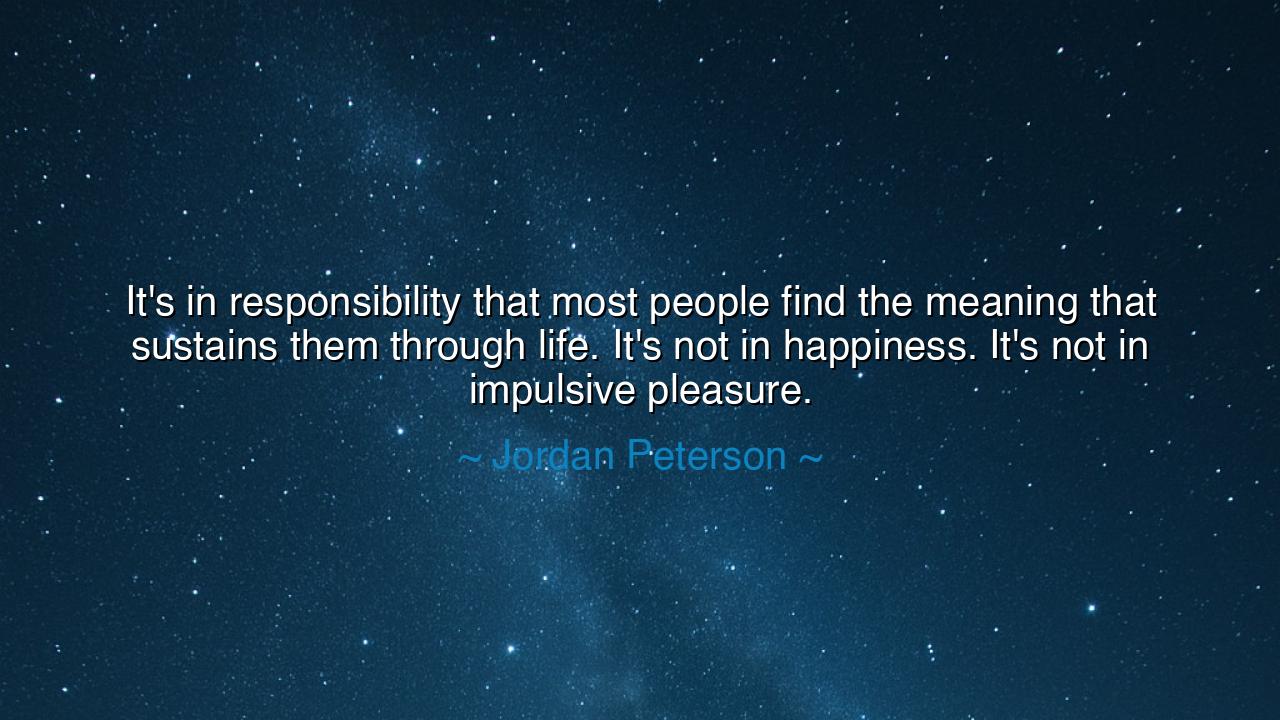
It's in responsibility that most people find the meaning that
It's in responsibility that most people find the meaning that sustains them through life. It's not in happiness. It's not in impulsive pleasure.






In the words of Jordan Peterson, “It’s in responsibility that most people find the meaning that sustains them through life. It’s not in happiness. It’s not in impulsive pleasure,” we hear the echo of an ancient truth — that meaning, not comfort, is the true nourishment of the soul. In these times, when pleasure is easy and distraction is endless, Peterson reminds us that the path to fulfillment is not paved with indulgence but with duty — with the noble weight of purpose carried willingly. His words are not cold commands; they are a call to strength, to live with the dignity of one who chooses responsibility over ease, sacrifice over self-interest, and meaning over mere satisfaction.
The origin of this teaching arises from Peterson’s reflections on psychology, mythology, and the timeless moral structures that shape human existence. Drawing from the wisdom of the ancients and the truths of modern science, he saw that happiness, though beautiful, is fleeting — a passing flame. But responsibility anchors the soul. It gives order to chaos, direction to wandering, and light to despair. For when a person takes responsibility — for their family, their work, their community, even for their own suffering — they cease to drift. They become rooted in meaning, and through that meaning, they endure.
This truth was known long before Peterson spoke it. The ancients carved it into their stories and lives. Consider the tale of Sisyphus, condemned by the gods to roll his stone forever up the hill. His punishment, though eternal, held within it a paradoxical victory. As the philosopher Albert Camus later wrote, “One must imagine Sisyphus happy,” for in embracing his task, he made peace with it. So too in life — when we carry our burdens willingly, we transform them from curses into callings. Responsibility does not destroy us; it defines us. It gives shape to suffering and turns endurance into meaning.
History offers countless examples of this truth. When Viktor Frankl, the Austrian psychiatrist, was imprisoned in the concentration camps of World War II, he witnessed the worst of human suffering. Yet he observed that those who survived spiritually were not the strongest or even the healthiest, but those who found meaning — who bore their suffering as part of a greater purpose. Frankl himself found strength by imagining his future lectures on the psychology of survival. In the midst of death, he chose responsibility: to bear witness, to learn, to endure. Out of that choice came Man’s Search for Meaning, one of the great testaments of the human spirit.
Happiness, Peterson reminds us, is fragile — a breeze that passes when the weather of life changes. Pleasure fades with repetition, and desire renews itself in endless hunger. But meaning endures. It gives a man something to rise for each morning, even when joy is absent and hope is dim. It is not found in the avoidance of pain, but in facing it — in doing what must be done even when the heart trembles. For in every noble task, from raising a child to serving a community to creating art that uplifts, there lies the quiet, sacred satisfaction of a life well-lived.
To live without responsibility is to live without direction — to drift upon the winds of impulse and mood. The man who seeks only pleasure finds emptiness; the one who seeks purpose finds peace. Responsibility, then, is not a burden but a crown — a weight that strengthens those who bear it. It is the bridge between suffering and redemption, between chaos and order, between the transient and the eternal.
Let this, then, be the lesson for all who seek meaning: Do not chase happiness as though it were the purpose of life. Instead, take up your burdens willingly. Care for something beyond yourself — a family, a craft, a truth, a dream. Build, protect, and serve. When life grows heavy, remember that it is through responsibility that you will find the strength to endure and the purpose to continue.
And so, as the ancients would have said: the path to greatness lies not in comfort, but in duty. Be courageous enough to be responsible, for only in that courage will you find the meaning that sustains the heart when all else fades. Happiness may visit and depart, but meaning — earned through responsibility — will remain, steadfast as the sun after every storm.






AAdministratorAdministrator
Welcome, honored guests. Please leave a comment, we will respond soon